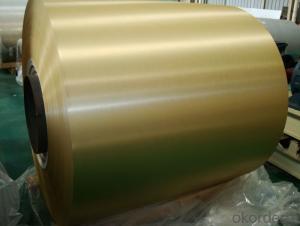Brushed Coated Aluminium Coils for Metal Wall ACP
- Loading Port:
- Shanghai
- Payment Terms:
- TT OR LC
- Min Order Qty:
- 5 m.t.
- Supply Capability:
- 10000 m.t./month
OKorder Service Pledge
OKorder Financial Service
You Might Also Like
Item specifice
1. Structure of Brushed Coated Aluminium Coils for Metal Wall ACP Description
• Product: Aluminim coils
• Application:
corrugated roofs, outer walls, ovens, electrically controlled cabinets.
household appliances, transportation, base plate, color coating.
industrial freezers in the residential and industrial buildings.
refrigerator backplane, gas stove, air conditioner, microwave, LCD border.
• Advantage: Full production line with all kinds of coils supply
2. Main Features of the Brushed Coated Aluminium Coils for Metal Wall ACP
• Our goods quality is top, the surface is smooth, and every steel coil
• No Joint, No Bends, no spots, no roller marks.
• MTC will be provided with goods, third part inspection is acceptable, for example, SGS, BV. Etc
3. Brushed Coated Aluminium Coils for Metal Wall ACP Images
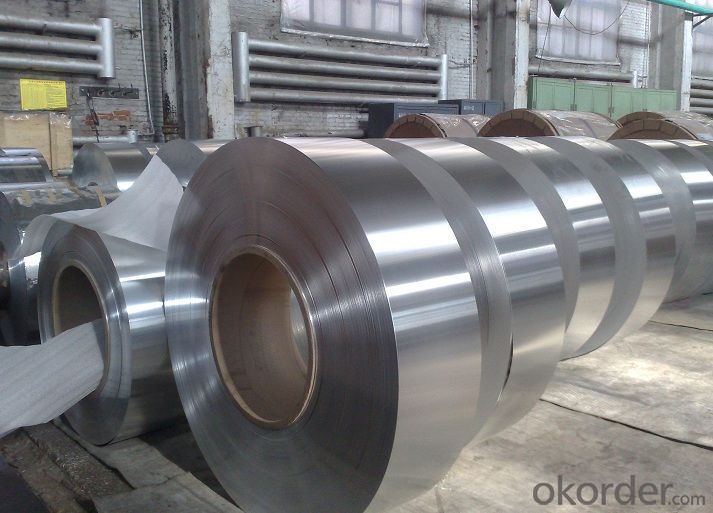
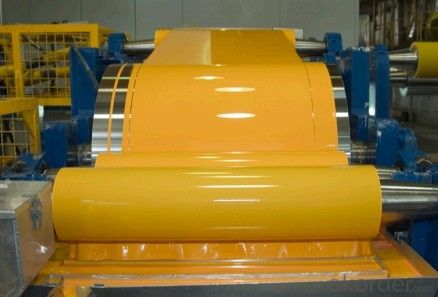
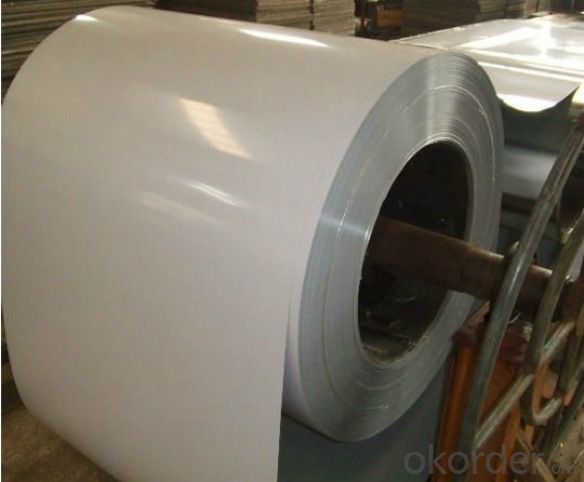
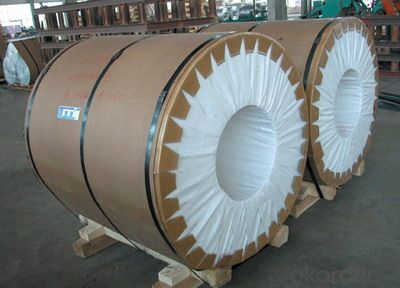
4. Brushed Coated Aluminium Coils for Metal Wall ACP Specification
Alloy | AA1050/1100/3003/3005/3105/5005/5052 etc |
Thickness | 0.03mm—4.0mm |
Width | 10mm—1600mm |
Coating | PVDF, PE |
Coatingthickness | Usually16-25 micron, could be 33-40 micron |
Color | According to Ral |
Standard | ASTM-B 209 GB/3008-2006 |
Usage/ApplicationsCoated Aluminum Coil/Sheet | Constructionand decoration, electronic appliances, lighting decoration, air-condition airpipe, sandwich panels and drainage, etc |
5.FAQ of Brushed Coated Aluminium Coils for Metal Wall ACP
We have organized several common questions for our clients,may help you sincerely:
① How about your company?
A world class manufacturer & supplier of aluminum coil and alloy blanks. Aluminum production base is comprised of 18 aluminum annealers, 10 coil and foil mills, 4 continuous production lines, 2 hot rolling production line and 3 prepainted lines.
Export 5000 tons per month to Asia, America and Middle East. Always do the best for our clients.
②Can you guarantee the quality of the products?
We are responsible for the quality of materials to get a long-term cooperation with clients in a reasonable period of time and we are glad to arrange and coordinate any third party inspection for you.
③What is the delivery time after purchase?
35 day after receiving client’s deposit or correct LC
- Q:Are aluminum coils suitable for architectural cladding applications?
- Yes, aluminum coils are suitable for architectural cladding applications. Aluminum is a versatile material that offers a range of benefits for cladding purposes. Firstly, aluminum is lightweight, making it easy to handle and install. This reduces the overall weight on the building structure and simplifies the construction process. Additionally, aluminum is highly durable and resistant to corrosion. This makes it an ideal choice for exterior applications, as it can withstand harsh weather conditions and maintain its appearance over time. Furthermore, aluminum coils can be fabricated into various shapes and sizes, allowing for flexibility in design. They can be easily formed, cut, and shaped to meet the specific requirements of the building project. Aluminum is also available in a wide range of finishes and colors, providing architects and designers with ample options to achieve the desired aesthetic for the cladding. Moreover, aluminum is a sustainable choice as it is 100% recyclable. This aligns with the growing focus on environmentally friendly construction practices. Overall, the versatility, durability, lightweight nature, and aesthetic options make aluminum coils a suitable choice for architectural cladding applications.
- Q:What are the different coil handling options available for aluminum coils?
- There are several coil handling options available for aluminum coils, depending on the specific requirements and preferences of the user. Some of the commonly used options include: 1. Coil Cradles: These are horizontal racks or frames on which the aluminum coils are placed. They provide support and stability to the coils during storage or transportation. Coil cradles are available in various sizes and designs to accommodate different coil dimensions. 2. Coil Cars: Coil cars are mobile platforms equipped with lifting mechanisms that allow for easy movement of aluminum coils. They are commonly used in manufacturing facilities where coils need to be transported between different processing stations. Coil cars can be manually operated or automated, depending on the level of automation desired. 3. Coil Turnstiles: Coil turnstiles are rotating devices that hold multiple coils vertically. They allow for easy access to individual coils without the need for heavy lifting or rearranging. Coil turnstiles are ideal for high-volume production environments where quick coil changeovers are required. 4. Coil Upenders: Coil upenders are specialized equipment used to rotate or flip aluminum coils to change their orientation. This is particularly useful when a coil needs to be loaded or unloaded from a vertical position, or when certain processes require a specific coil orientation. 5. Coil Lifters: Coil lifters are a type of lifting device specifically designed to handle aluminum coils. They typically feature adjustable arms or clamps that securely grip the coil, allowing for safe and efficient lifting. Coil lifters come in various configurations, including manual, semi-automatic, and fully automated models. 6. Coil Tippers: Coil tippers are used to tilt or incline aluminum coils for various purposes, such as facilitating coil feeding into processing machines or enabling easier coil inspection. They can be operated manually or powered by hydraulic or pneumatic systems. 7. Coil Stackers: Coil stackers are used to neatly stack and store aluminum coils vertically. They typically feature adjustable arms or forks that can be raised or lowered to accommodate different coil sizes. Coil stackers help optimize storage space and ensure easy access to coils when needed. These are just a few examples of the coil handling options available for aluminum coils. Each option offers its own advantages and may be suitable for different applications or industries. It is important to carefully consider the specific requirements and constraints before selecting the most appropriate coil handling solution.
- Q:What are the electrical conductivity properties of aluminum coils?
- Aluminum coils are known for their excellent electrical conductivity. Among metals, aluminum is the second most conductive after copper. In fact, aluminum's conductivity is about 61% of copper's conductivity. This makes aluminum coils a popular choice when high conductivity is needed in electrical applications. The reason behind aluminum's electrical conductivity lies in its atomic structure. Aluminum atoms have a significant number of free electrons, which are responsible for the flow of electric current. These free electrons can easily move through aluminum's lattice structure, allowing for efficient electrical conduction. Additionally, aluminum has low resistance, resulting in minimal energy loss during electricity transmission. This makes aluminum coils a cost-effective option for electrical wiring, power transmission lines, and other applications that require efficient conductivity. It is worth noting that aluminum's electrical conductivity decreases slightly as temperature increases. However, this decrease is relatively small compared to other metals, making aluminum coils reliable even in high-temperature applications. To summarize, aluminum coils possess excellent electrical conductivity properties, making them suitable for a wide range of electrical applications. Their high conductivity, low resistance, and cost-effectiveness contribute to their widespread use in various industries.
- Q:Are there any environmental considerations when using aluminum coils?
- Yes, there are several environmental considerations when using aluminum coils. Firstly, the production of aluminum coils requires mining and extraction of bauxite, which can lead to habitat destruction and biodiversity loss. Additionally, the extraction and refining processes consume significant amounts of energy, contributing to greenhouse gas emissions. However, aluminum is highly recyclable, and using recycled aluminum reduces the environmental impact by saving energy and reducing waste. Proper disposal and recycling of aluminum coils are crucial to minimize environmental harm.
- Q:My school has lunched catered in daily because it cuts down on staff in the kitchen. The food is delivered in individual aluminum containers for each student. In doing so, the school uses 99,000 aluminum trays in one school year, all of which get thrown away. I'm trying to find an alternative such as biodegradable food containers. Does anyone have any ideas? The container has to be able to withstand the heat of an oven.
- Aluminum is very recyclable and profitable to do so. It takes 95% less energy to recycle aluminum then to create new aluminum. I doubt that you will find a better alternative that will withstand oven heat. You need to start a recycling program
- Q:How do aluminum coils compare to other metal coils?
- Aluminum coils are generally lighter, more corrosion-resistant, and have better thermal conductivity compared to other metal coils. They are also easier to shape and mold, making them a popular choice in various industries including automotive, aerospace, and HVAC.
- Q:Are aluminum coils compatible with different welding methods?
- Yes, aluminum coils are compatible with different welding methods. Aluminum is a versatile metal that can be welded using various techniques such as gas tungsten arc welding (GTAW), also known as TIG welding, and gas metal arc welding (GMAW), also known as MIG welding. These methods are commonly used for welding aluminum coils due to their ability to produce high-quality welds with good strength and appearance. TIG welding is particularly suitable for aluminum as it allows for precise control of heat input and provides excellent weld quality. It uses a non-consumable tungsten electrode and an inert gas such as argon to shield the weld zone from atmospheric contamination. MIG welding, on the other hand, is a faster process that uses a consumable wire electrode and a shielding gas to protect the weld pool. It is widely used in industrial applications due to its efficiency and ease of use. In addition to TIG and MIG welding, other methods such as laser welding and friction stir welding can also be used for aluminum coils, depending on the specific requirements of the application. It is important to note that proper preparation, including cleaning and surface treatment of the aluminum coils, is crucial for achieving successful welds. This ensures the removal of any contaminants or oxide layers that may negatively affect the welding process. Overall, aluminum coils are compatible with different welding methods, and the choice of technique depends on factors such as the desired weld quality, production requirements, and the skills and equipment available.
- Q:How are aluminum coils protected against moisture?
- Aluminum coils are protected against moisture through a process called coating. The coils are coated with a layer of protective material, such as a polymer or paint, that acts as a barrier between the aluminum and the surrounding environment. This coating prevents moisture from coming into direct contact with the aluminum surface, thereby reducing the risk of corrosion and damage. Additionally, some manufacturers may apply a special sealant on the edges of the coils to further enhance moisture resistance. These protective measures ensure that the aluminum coils remain durable and perform optimally even in humid or wet conditions.
- Q:What are the density and specific gravity values of aluminum coils?
- Aluminum coils have a density of around 2.7 grams per cubic centimeter (g/cm³) or 2700 kilograms per cubic meter (kg/m³). The specific gravity of aluminum coils is roughly 2.7.
- Q:I have aluminum windows that have to be replaced due to bad thermopanes - there is accumulated grime and humidity in between the panes. Is it possible to buy individual custom-sized replacements or do I have to get all new windows and frames? Any referrals would be helpful.
- you can just get the panes cleaned and restored you could even do it yourself, they are just two sheets of glass stuck to a frame
1. Manufacturer Overview |
|
|---|---|
| Location | |
| Year Established | |
| Annual Output Value | |
| Main Markets | |
| Company Certifications | |
2. Manufacturer Certificates |
|
|---|---|
| a) Certification Name | |
| Range | |
| Reference | |
| Validity Period | |
3. Manufacturer Capability |
|
|---|---|
| a)Trade Capacity | |
| Nearest Port | |
| Export Percentage | |
| No.of Employees in Trade Department | |
| Language Spoken: | |
| b)Factory Information | |
| Factory Size: | |
| No. of Production Lines | |
| Contract Manufacturing | |
| Product Price Range | |
Send your message to us
Brushed Coated Aluminium Coils for Metal Wall ACP
- Loading Port:
- Shanghai
- Payment Terms:
- TT OR LC
- Min Order Qty:
- 5 m.t.
- Supply Capability:
- 10000 m.t./month
OKorder Service Pledge
OKorder Financial Service
Similar products
New products
Hot products
Related keywords
